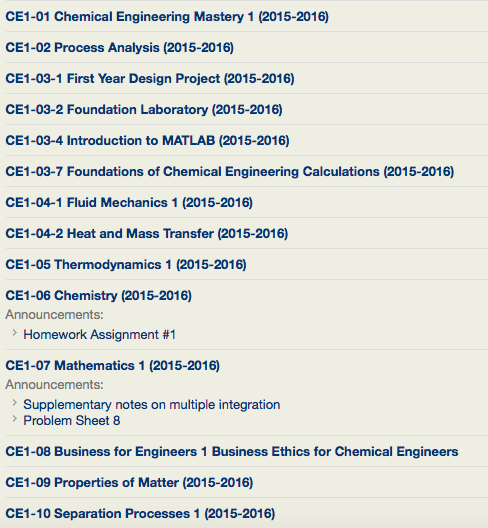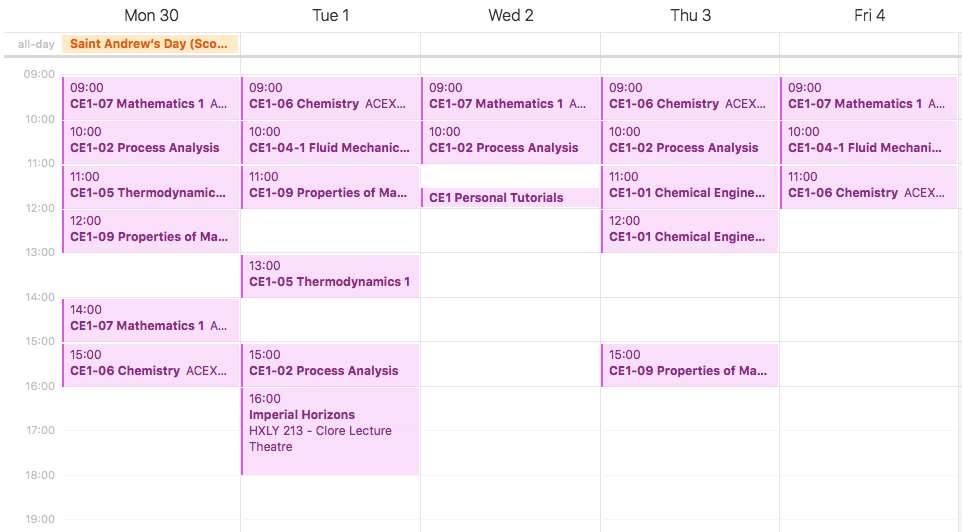I think one of the many positive aspects about ChemEng is that we study a whole bunch of different subjects. While other courses have 4-5 subjects, we have … hmmm… well… I don’t really know 😀
According to Blackboard (online platform where all of the course notes and homeworks are), we have 14 different “things”, but some of them are jointly called “coursework” subjects (CE1-03) and we will get only one mark for it at the end. So, I am quite confused when someone asks how many subjects I have, but here is the list:

Another interesting thing is our timetable. (Maybe it’s just me who finds this fascinating, but) we got an email at the beginning of the year, containing a link. When I clicked on the link, a pop-up window asked “Do you really want this?” Well, at least I was warned… But I said yes, and suddenly all my lectures/tutorials/other activities were imported into my personal calendar! It’s a subscribable calendar system, meaning it refreshes itself every hour and all the changes are immediately visible. Therefore if a tutor reschedules a tutorial and accidentally mistypes something, the whole class will have a random Maths appearing in their calendar all of a sudden… It is very scary! 😀

After this intro, let’s talk a bit about the subjects! Engineering is quite special in the sense that most of the curriculum is very different from that of the high school. (I don’t know much about the English secondary education system, as I did the high school in Hungary, but I guess most things are the same). In high school we had general subjects like Chemistry or Physics. Now we have more specific ones like “Properties of Matter” or “Fluid Mechanics”. Hence I think it worths giving a brief description about these ChemEng subjects…
01 Chemical Engineering Mastery
This is our main subject, nevertheless it’s not a real subject! 😀 Mastery includes the core subjects like Process or Fluid, and we have one pass/fail Mastery exam at the end. Additionally, we have Mastery sheets (5 this year): each contains 1 very long problem description and 3-4 related questions. We also have Mastery seminars which are held by different professors every week and they give a summary of their subjects and some exam tips and tricks… 🙂
02 Process Analysis
Hmmm, Process… Process is my favourite subject! (As I already mentioned in the post about the Christmas test.) We learn about process flow diagrams, stream tables, mass balances, vapour-liquid equilibrium, etc. Unfortunately, it’s only in the Autumn term 🙁 The good thing about Process is that “we have to put our chemical engineer / business / environmental hats on” and at the end, we are standing there with “3 hats” and design processes as big as a building on a piece of paper… The bad thing is that it takes ages to calculate everything we need because there are so many different equations and data to use. And unless you do it in Excel, you’ll definitely make a mistake somewhere…
03-1 First Year Design Project
I already wrote about this in another post, so I just mention one thing here: don’t forget the remaining power, for God’s sake! …
03-2 Foundation Laboratory
I don’t know much about this as we’ll only start it next term, but I know that we’ll work in pairs which is scary 😀 I would like to apologise in advance to my future lab-partner for splashing them with sulphuric acid… It won’t be on purpose…
03-4 Introduction to MATLAB
I also mentioned this before. Matlab is about coding, so those who did any kind of coding before will be fine. Those who didn’t… well, they should drink some coffee before the lectures. 🙂
03-7 Foundations of ChemEng Calculations
This subject was only 5 lectures long at the very beginning of the term. We looked at the unit conversions and dimensional analysis. It might sound silly (Unit conversions? Everyone can convert joules to kilojoules…), but when it comes to converting from cal/(gmol.K) to BTU/(lbmol.ºR) you wish you had choose Classical Literature instead of Engineering…
04-1 Fluid Mechanics
Everyone likes Fluid. Our lecturer is a nice and cheerful guy who tells jokes all the time. As he explains it the material looks dead easy, even the toughest equations make some sense during the lecture. But when it comes to the tutorial sheets, we are usually completely lost… 😀 Apart from that, I like Fluid. We started with incompressible fluids and we are now dealing with compressible ones. My sister is a wannabe pilot, so I often text her after the lectures and we discuss what I’ve learnt and what she already knows… 😀 One more thing about Fluid: it’s only in the first term 🙁
04-2 Heat and Mass Transfer
This is again a Spring term subject, but I’ve already heard horror stories… Everyone says that this is the most difficult subject, so I am a bit worried. We’ll see!
05 Thermodynamics
Many people struggle with Thermo because it’s full of equations, derivations, calculus, difficult concepts and new approaches. In high school I learnt about the Laws of Thermodynamics – in 3 lessons. Now we’ve been learning about them since October and we’re still just halfway through the Second… The lecturer is also my personal tutor, and he is very kind and answers all the questions – if he gets any. The problem is, most people don’t even know what to ask… 😀
06 Chemistry
It might be surprising that we study Chemical Engineering and we only have one specially dedicated pure Chemistry subject… I was surprised, too! But this Chemistry is intense enough to satisfy even the hardcore chemistry-lovers. We study about Chemical Bonding, Solubility and pH, Kinetics, and then at the end a lot of Organic Chemistry. This subject requires (or would require…) the most self-study: if you don’t read the recommended textbooks lesson by lesson, you’ll get lost and if you get lost, you’ll basically never have enough time to catch up… But the lecturer is amazing, he makes so much effort to properly animate every little bit of the power points. I wonder how many hours he spends on a daily basis just with animating the slides… 😀
07 Mathematics
Oooo, Maths… Just to make it clear: I love Maths. If I didn’t do ChemEng, I would be studying Maths… But I’ve chosen ChemEng, so my only interaction with Maths is the Maths lecture 3 times a week. And for those who love Maths, it’s just not really enough… Since we’re doing Engineering, we don’t really need to know how to prove the theorems. Or know the super-accurate results. Or know the exact definitions of the Riemann-integration…
08 Business for Engineers
This will also be only next term, but I heard that it’s super-easy… 😀
09 Properties of Matter
Well, for some reason everyone loves PoM… Except me… I mean, the lecturer is very good, the lectures are more or less understandable, but the topic is just not my cup of tea. Or coffee. Speaking of coffee, I don’t think there exists such thing as enough amount of coffee before a PoM lecture. Seriously, the different solutions of the Schrödinger-equation can only be understood when you’re 100% awaken. Which is definitely not at 9 am…
10 Separation Processes
We’ll only have this in the Spring term, and I haven’t heard anything about it yet. Interesting…
So, that’s it, this is everything we have! One could say it’s a bit too much, and sometimes it do feels a bit too much, but most of the time it’s very enjoyable and I am glad I ended up doing ChemEng at Imperial. 🙂



